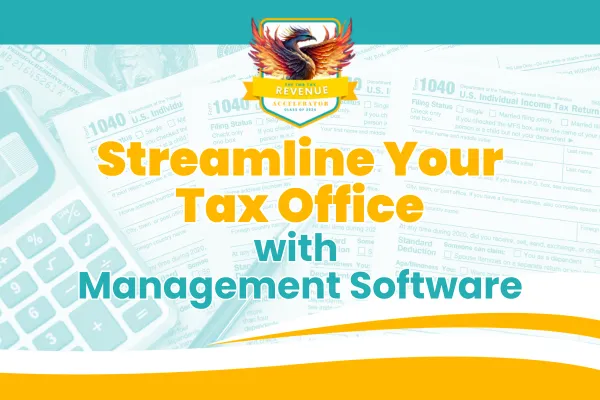Tax Revenue Manager
BLOGS

Boosting Productivity: The Benefits of Tax Office Management Software
Introduction:
In today's fast-paced world, efficiency and productivity are crucial for any business to thrive. This is especially true for tax professionals who deal with complex processes and numerous clients. Thankfully, tax office management software has emerged as a game-changer in the industry. In this blog post, we will explore the various benefits of using tax office management software to boost productivity and streamline operations.

With that said, efficiency and productivity are crucial for any business to thrive. 👊
Main Benefits of Tax Office Management Software
Streamlining Workflow: One of the key advantages of tax office management software is its ability to streamline workflow. With the software's intuitive interface and user-friendly features, tax professionals can easily navigate through various tasks, such as client onboarding, document management, and tax preparation. By automating these processes, the software eliminates repetitive manual work, saving time and effort for tax professionals.
Automating Tedious Tasks: Tax preparation involves several tedious tasks, such as data entry, calculations, and form filling. Tax office management software automates these tasks, reducing the chances of human errors and improving accuracy. This automation not only saves time but also ensures compliance with tax regulations and reduces the risk of penalties or audits.
Improving Accuracy and Compliance: Accuracy is paramount in the tax industry. Tax office management software comes equipped with built-in error-checking mechanisms and standardized templates to ensure accurate calculations and filings. Additionally, the software keeps up with the latest tax laws and regulations, minimizing the risk of non-compliance.
Enhanced Efficiency through Advanced Features
Centralized Data Management: Tax office management software provides a centralized platform for storing and accessing client data, documents, and reports. This eliminates the need for physical filing systems and enables tax professionals to retrieve information quickly and easily. Moreover, the software allows multiple users to collaborate on client files simultaneously, enhancing efficiency and teamwork.
Real-Time Reporting and Analytics: With tax office management software, generating reports and analyzing data becomes a breeze. The software offers real-time reporting and analytics capabilities, enabling tax professionals to gain valuable insights into their clients' financial situations. These insights help in making informed decisions, identifying trends, and providing proactive tax planning advice.
Client Collaboration Tools: Communication and collaboration with clients are crucial for a successful tax practice. Tax office management software offers various collaboration tools, such as secure client portals and messaging systems, to facilitate seamless interaction between tax professionals and clients. These tools enhance client satisfaction by providing transparency, convenience, and timely updates.
Cost Savings and Return on Investment
Reduced Operational Costs: By automating tasks and improving efficiency, tax office management software reduces operational costs. The software eliminates the need for excessive paperwork, reduces printing and storage expenses, and minimizes the risk of errors that can result in costly penalties. Moreover, the time saved by using the software can be utilized for revenue-generating activities.
Increased Revenue Opportunities: Tax office management software empowers tax professionals to take on more clients and provide high-quality services. The software's automation and accuracy features enable tax professionals to handle a larger workload without compromising on quality. This scalability opens up new revenue opportunities and helps in growing the business.
Improved Client Satisfaction: Happy clients are the backbone of any successful tax practice. Tax office management software enhances client satisfaction by providing a seamless and personalized experience. The software's collaboration tools, real-time updates, and accurate filings ensure that clients receive prompt and reliable service, leading to long-term client relationships and positive word-of-mouth referrals.
Factors to Consider when Choosing Tax Office Management Software
Scalability and Customization: It is essential to choose tax office management software that can scale with the growing needs of the business. The software should offer customization options to adapt to the unique workflows and requirements of the tax practice.
Integration with Existing Systems: Compatibility with existing systems, such as accounting software or CRM platforms, is crucial for seamless data integration and workflow continuity. The software should have robust integration capabilities to ensure smooth operations.
Data Security and Compliance: Tax professionals deal with sensitive client information, making data security a top priority. The software should adhere to industry-standard security protocols and offer features like encryption, access controls, and regular data backups to safeguard client data.
Vendor Support and Training: When choosing tax office management software, it is crucial to consider the level of vendor support and training provided. The vendor should offer comprehensive onboarding, training, and ongoing support to ensure a smooth transition and optimal utilization of the software's features.
Conclusion
Tax office management software is a powerful tool that can revolutionize the way tax professionals operate. By streamlining workflow, automating tedious tasks, and improving accuracy, this software boosts productivity and frees up time for tax professionals to focus on providing high-quality services and growing their business. The enhanced efficiency, cost savings, and improved client satisfaction achieved through tax office management software make it a valuable investment for any tax practice. Embrace the power of technology and take your tax office to new heights of productivity!

TRM: Streamlining Tax Solutions for Efficient Financial Management. Enhance compliance, optimize revenue, and stay organized effortlessly.
Get in touch
2100 N Eastern Avenue, Ste 222, Moore, Oklahoma, United States, 73160
